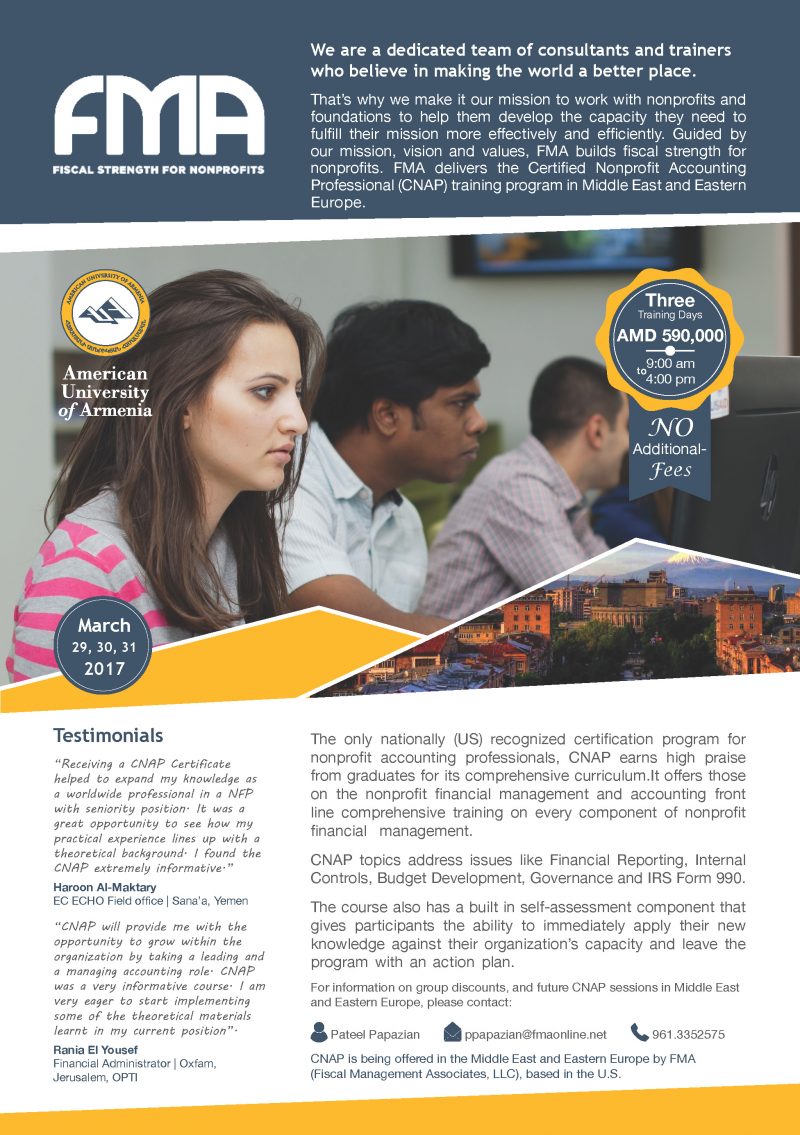
AUA Extension to Provide First Certified Nonprofit Accounting Professional Program in Armenia
3 min read YEREVAN, Armenia – This Spring, the Extension program of the American University of Armenia (AUA Extension) continues to expand its repertoire of offered courses, training, and certification programs. With the number of non-profit organizations increasing in Armenia and bringing about positive change, AUA Extension is proud to announce the arrival of the US Certified Nonprofit Accounting Professional (CNAP) training program at AUA.
YEREVAN, Armenia – This Spring, the Extension program of the American University of Armenia (AUA Extension) continues to expand its repertoire of offered courses, training, and certification programs. With the number of non-profit organizations increasing in Armenia and bringing about positive change, AUA Extension is proud to announce the arrival of the US Certified Nonprofit Accounting Professional (CNAP) training program at AUA.
The Certified Nonprofit Accounting Professional (CNAP) training program is sponsored by member firms of the National Association of Nonprofit Accountants & Consultants (NPAC) in the US, and is the only U.S. recognized certificate program for nonprofit accounting professionals. The program has been developed to recognize excellence in the nonprofit industry through comprehensive qualification, training, and examination.
Whether participants use this course as a refresher or as a means to gain specific knowledge, the unique hands-on curriculum includes ideas to improve the operational and financial results of your nonprofit, as well as standardized accounting practices that can be implemented immediately. The curriculum includes basic and intermediate non-profit accounting, as well as in-depth training on more advanced topics such as internal controls, current tax issues, IRS audits, lobbying, technology, and budgeting for non-profit organizations.
The training program will be led by Financial Trainer and Compliance Consultant Ms Pateel Papazian (a US CPA based in Beirut), whose areas of expertise include Financial Training, Budget Management, Regulatory Compliance and many others. Her extensive professional experience includes Director of Financial Reporting & Compliance and the American University of Beirut (2010 – 2012), Chief Financial Officer at the Lebanese Association for Development (2008 – 2010), and Director at KPMG (1998 – 2008). To delve into further detail of the course and what it can offer participants, AUA sat down with Ms. Papazian for a Q&A:
- How long have you been with Fiscal Management Associates (FMA), LLC? What inspired you to work with nonprofits specifically?
- I started representing the CNAP program offered by FMA in 2014. During my tenure at KPMG, I used to audit for-profit and non-profit clients. Eventually, I ended up becoming the Director of the non-profit department there. I truly enjoy working with nonprofits and training nonprofit staff, because there is a story behind the numbers.
- In your opinion, what is the key to maintaining a balance between social responsibility and entrepreneurship in a non-profit organization? How does the CNAP work to prepare participants to bring said balance to their respective organizations?
- The CNAP program is mainly aimed at nonprofit accounting and finance staff. Staff who are involved in budgeting, costing, financial reporting and ensuring compliance with grant requirements. Our focus is on attendees learning the intricacies of non-profit accounting, which is in a lot of respects different than for-profit accounting.
- What are the benefits of a Certified Nonprofit Accounting Professional (CNAP) qualification? Which parts of the world is it recognized in?
- CNAP professional benefits include national industry recognition, enhanced industry knowledge, and skills, access to industry resources via participating NPAC* member firms and other CNAPs, as well as increased value to your nonprofit organization.
Until the end of 2013, CNAP was only offered in the US. I began delivering the course in the Middle East in January 2014 and now am also delivering it in Eastern Europe.
*The NPAC is a nationwide network of CPA firms specifically selected for their experience in, and commitment to, serving the nonprofit community. NPAC members combine their expertise to provide the highest quality services to improve the performance of nonprofit organizations. Through NPAC’s educational programs and the continuous exchange of ideas and information, NPAC members stay on the forefront of developments in the industry.
- Does the CNAP qualification provide access to an international network of professionals in the field?
- This is two fold. By attending the trainings, delegates meet their peers who work in other nonprofits and they touch base. There is also a private group on LinkedIn, which we have set up for CNAP holders.
- What are the most common mistakes that contribute to inefficient accounting among non-profit organizations?
- The use of cash basis is an issue. Some nonprofits still tend to use modified accrual or modified cash basis, which is not ideal. The accrual basis should be used by all.
- Likewise, what are some adjustments that can be made in a nonprofit’s fiscal system, which immediately contributes to a more organized and efficient fiscal outlook?
- Making sure that all accrued expenses and earned revenues have been recognized, even if not paid or received in cash.
- As a certified trainer of FMA, what’s your barometer for success among trainees and course participants?
- An online exam is administered after completion of the course. The passing grade is 70 over 100. This is the main barometer. Other than that, discussions during the training and the administered classwork is also a barometer.
To learn more about the course, please contact the AUA Extension here.
Founded in 1991, the American University of Armenia (AUA) is a private, independent university located in Yerevan, Armenia and affiliated with the University of California. AUA provides a global education in Armenia and the region, offering high-quality, graduate and undergraduate studies, encouraging civic engagement, and promoting public service and democratic values.

